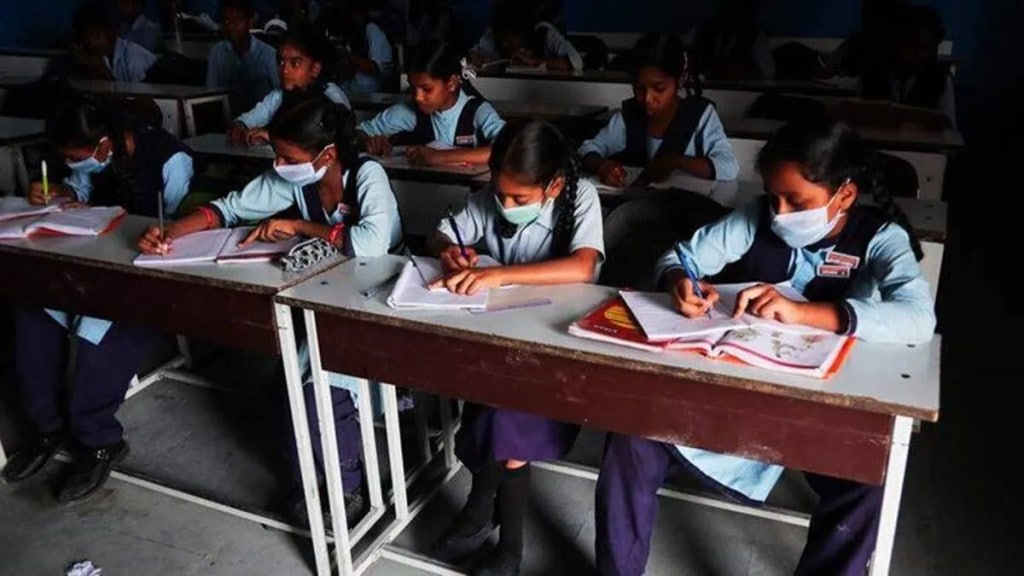As the new National Education Policy (NEP) 2020 entered its third year, the Ministry of Education (MoE) boasts about its successful implementation across primary, secondary, and higher education levels. The Ministry highlighted the initiatives undertaken by the government till date to transform the education system in the country during the Akhil Bhartiya Shiksha Samagam on July 29, 2023.
FE Education looks at some of these initiatives at the school education level and the development made so far.
PM SHRI Schools: The PM Schools for Rising India scheme was introduced in September, last year with a fund size of Rs 27,000 crore to transform 14,500 schools based on NEP recommendations. The first installement of PM SHRI of Rs 630 crore was released just recently by Prime Minister Narendra Modi on July 29, 2023 on the occasion of the third anniversary of NEP 2020.
NIPUN BHARAT: The National Mission on Foundational Literacy and Numeracy was launched in July, 2021. According to the Performance Grading Index for Districts (PGI-D) 2020-22, as many as 166 districts made improvements in their learning outcome as compared to 2019-2020. However, none of the districts could attain top two grades- Daksh and Utkarsh during this period. The report said there is ample scope for
making improvement in qualitative aspects of school education.
Vidya Pravesh: This is a three-month school preparation module for grade one students between the age group of six to seven years developed by NCERT. The objective of the scheme is to support the learning and adjustment of children entering grade one with the primary school curriculum at the beginning of the academic session. As per the government data, 33 States/UTs except Sikkim, Manipur and Kerala have implemented Vidya Pravesh from the year 2022-23. Under this, 1,80,13,930 students from 8,77,793 schools participated across States/UTs.
NCF FS: The National Curriculum Framework for Foundational Stage was launched in October 2022 to integrate the curriculum framework for children between three to eight years in India. The reform was introduced in continuation to the 5+3+3+4 ‘curricular and pedagogical’ structure proposed under NEP 2020. So far, the government has launched Jadui Pitara: Learning Teaching Material (Jadui Pitara) based on NCF FS. The launch was made on February 20, 2023.
PARAKH: The Performance Assessment, Review, and Analysis of Knowledge for Holistic Development is a new vertical under NCERT which was set up on February 8, 2023. The standard setting body proposed the development of a Holistic Progress Card to keep a track of the 360 degree learning outcomes of students. Currently, talks are underway to implement HPC at the Foundational and Preparatory stage from the year 2023-24, the government said.
PM e-VIDYA: This initiative was launched in May 2020 to unify digital, online and on-air efforts to enable multi-mode access to education. So far, the government claims to have published 3.17 lakh e-contents, introduced 6,600 Energised Textbooks in 36 languages, and 12 Swayam Prabha TV Channels, among other initiatives. Besides, for children with special needs, more than 4,200 Indian Sign language (ISL) based contents, Talking books and 3,860 Audio Books have been developed.
Integrated Teacher Education Programme (ITEP): This is a four-year teachers training programme notified in 2021, which includes IITs, NITs, RIEs and Government Colleges. It will be run by 41 Central/State University/Institutions from academic session 2023-24.
ULLAS: Understanding of Lifelong Learning for All in Society is a newly mobile phone application by the government on July 29, 2023. The app provides learning assistance to all non-literates who are 15 years and above. The government has launched the app with a financial outlay of Rs.1037.90 crore for implementation during FY 2022-23 to 2026-27.
Besides, the government has rolled out several other initiatives to check the quality and competencies of teachers such as National Professional Standards for Teachers (NPST), provide mentorship through National Mission for Mentoring (NMM), and run a volunteer management programme, Vidyanjali Portal to connect schools with people who want to share their knowledge and skills or contribute in the form of assets/material/equipment.
